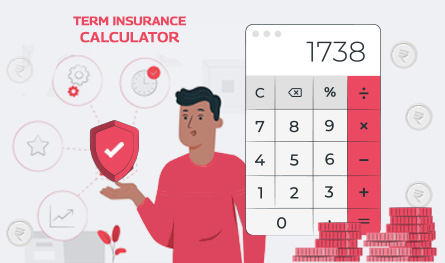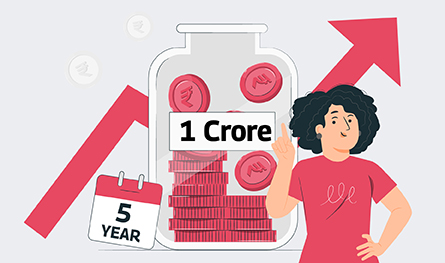Difference Between Whole Life Insurance and Term Life Insurance Policy
.png)
Mr. Iyer is a 58-year-old man, thinking of buying a life insurance policy, as he is soon to get into the senior citizenship club. He wants to safeguard his family’s future but he is confused which one to buy, a term life insurance or a whole life insurance plan? There are many people like Mr. Iyer who want to buy a life insurance plan, but can’t decide which one to buy? Such people must take time out for a thorough term vs. whole life insurance.
So, get ready for a complete term vs. whole life insurance in this post. We bet after reading the complete post, you and people like Mr. Iyer will be able to make the best decision for themselves on whether to buy a whole life insurance policy or a term insurance policy.
.png)
- What is a Whole Life Insurance Policy?
- What is a Term Insurance Policy?
- Whole Life Insurance vs Term Life Insurance
- Term Insurance vs. Whole Life Insurance – Benefits Comparison
- Which is Better? Term Life Insurance or Whole Life Insurance
- Things to Consider before buying a Term Life Insurance or Whole Life Insurance Plan
What is a Whole Life Insurance Policy?
As the name suggests, a whole life insurance plan is a whole life or permanent life insurance plan. It is a plan that keeps you protected financially, and won’t expire as long as you are paying the premium payments. The best feature of a whole life insurance plan is that it offers cash value that can be used for arranging funds for your future needs. You can even take loans against the policy, and the loans will be completely tax-free. However, the income gained from the withdrawals will incur some income tax for sure.
What is a Term Insurance Policy?
When anyone talks about life insurance, he/she is most of the time talking about a term life insurance policy. The easiest to understand and offering amazing benefits like death benefits and additional riders, a term life insurance is the most popular type of life insurance policy. It can be bought for a short-term from 5 to 30 years, depending on your needs. This simple and fixed duration policy is quite affordable for a majority of people.
Difference Between a Whole Life Insurance and Term Life Insurance
Now, comes the time to learn about the differences between the two types of life insurance with a one-to-one term vs. whole life insurance.
| Feature |
|
|
|||
|
|
|
|||
|
|
|
|||
|
|
|
|||
|
|
|
|||
|
|
|
|||
|
|
|
|||
|
|
|
|||
|
|
|
|||
|
|
|
Pros and Cons of Term Insurance vs. Whole Life Insurance – Benefits Comparison
Pros and Cons of Term Life Insurance Policy
|
|
||||
|
|
||||
|
|
Pros and Cons of Whole Life Insurance Policy
|
|
||||
|
|
||||
|
|
||||
|
|
||||
|
|
Which is Better? Term Life Insurance or Whole Life Insurance
Now, comes the big question of whether to buy a term life insurance or a whole life insurance? Which one is better in term vs. whole life insurance? It actually depends on your needs and expectations. Varying on your needs, both plans can be good for you. Those looking for only short-term life insurance because they can’t afford to pay the life-long premiums must opt for term life insurance. Whereas, those who want to enjoy a whole life coverage, and have no financial restraints must opt for a whole life insurance policy.
Things to Consider before buying a Term Life Insurance or Whole Life Insurance Plan
Apart from using the term vs whole life insurance calculator there are several other factors to consider before buying a term or whole life insurance plan. Have a look:
- Age
- Current health condition
- Retirement plans
- Family financial needs
- Age of your children
- Children’s educational needs
- Income and capability to pay the premium
- Debts and mortgages
- Serious health issues or critical illness
- Existing life insurance plans and other policies
Term vs. Whole life insurance
Term life insurance offers coverage for a certain number of years, often 10, 20, or 30. If the policyholder dies during the term, the insurance company pays the selected beneficiaries a death benefit. Unless the insurance is renewed before the term expires, the policy expires and the coverage terminates.
Whole life insurance offers coverage for the policyholder's whole life. It combines a death benefit with a cash value savings component. The policyholder pays a premium, a portion of which is applied to the death benefit and the remainder to the cash value account.
The choice between term and whole life insurance depends on your individual needs and financial goals. Term life insurance is generally more affordable and provides coverage for a specific period, making it a good option for those who need coverage for a limited time or have a tight budget. Whole life insurance is more expensive, but it offers lifetime coverage and a savings component that can accumulate value over time.
Many term life insurance policies offer a conversion option that allows you to convert the policy to a whole life insurance policy without having to undergo a medical exam. This can be a convenient way to transition from a term policy to a permanent policy without having to re-qualify for coverage. However, the conversion may result in higher premiums.

Author Bio
Paybima Team
Paybima is an Indian insurance aggregator on a mission to make insurance simple for people. Paybima is the Digital arm of the already established and trusted Mahindra Insurance Brokers Ltd., a reputed name in the insurance broking industry with 17 years of experience. Paybima promises you the easy-to-access online platform to buy insurance policies, and also extend their unrelented assistance with all your policy related queries and services.
Other Life Insurance Products
Latest Post
.png)
If you are planning to buy two-wheeler insurance and are seeking answers to some frequently asked questions, look no further. Read on to know the two wheeler insurance FAQs related to bike insurance policy in this post.


Let’s be honest – life insurance planning isn’t exactly someone’s weekend hobby. It is the financial equivalent of flossing: we understand its importance, but we tend to put it off. But somewhere between balancing work and life, you might realise you need to have a solid plan in place – just in case.


If you think of life insurance, chances are you are picturing something people buy in their 30s or 40s. But what if you are 65 or older and just getting started? The good news is that you are never too late. Whether you are thinking of easing the financial burden on your family, covering final expenses, or simply leaving behind a legacy, there are life insurance options tailored just for you.
This article will be a guide to life insurance for senior citizens above 65 years, explaining why it is important, the type of insurance options, and how to get the right policy for you.


Health insurance plans are purchased with the hope of medical protection in times of need. However, sometimes it ends up being a source of surprise and disappointment. This mostly happens when people rush to buy health insurance plans, often overlooking essential aspects. Ignoring waiting period clauses, misunderstanding exclusions, and being unaware of sub-limits can lead to unwanted problems in the future.


If you are looking at investment policies offering INR 1 Crore in 5 years, we talk about some excellent plans in this post to help you choose the best one and reach your goal. However, it is important not to get swayed. Doing proper research and taking advice from financial or insurance advisors is important. Learn about such investment plan in this post.




